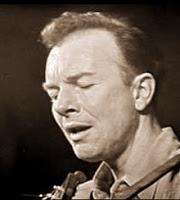If I had a bell,I'd ring it in the morning,I'd ring it in the evening,All over this land,I'd ring out danger,I'd ring out a warning,I'd ring out love between,My brothers and my sisters,All over this land.
If I had a songI'd sing it in the morningI'd sing it in the eveningall over this landI'd sing out dangerI'd sing out a warningI'd sing out love betweenmy brothers and my sistersall over this land
Well, I've got a hammerand I've got a belland I've got a song to singall over this landIt's the hammer of justiceIt's the bell of freedomIt's a song about love between mybrothers and my sistersall over this land
 Contrairement à ce que peut laisser croire la version française de cette chanson (adaptation de Vline Buggy et Claude François), il ne s’agit pas d’une gentillette louange de la famille et du travail, mais une chanson contestataire, écrite par Pete Seeger et Lee Hays, et chantée pour la première fois lors d’un gala de soutien aux dirigeants du parti communiste des Etats-Unis d’Amérique, en juin 1949, en procès pour sédition. Pete Seeger l’a chantée aussi en première partie du second concert de Paul Robeson (la tenue du premier ayant été empêchée par une violente manifestation anti-communiste principalement animée par des membres du Ku-Klux-Klan). « My brothers and my sisters » est la terminologie employée à cette époque aux Etats-Unis pour désigner les camarades syndicalistes, de même que le marteau symbolise le pouvoir. On est loin de la mièvrerie sautillante…
Contrairement à ce que peut laisser croire la version française de cette chanson (adaptation de Vline Buggy et Claude François), il ne s’agit pas d’une gentillette louange de la famille et du travail, mais une chanson contestataire, écrite par Pete Seeger et Lee Hays, et chantée pour la première fois lors d’un gala de soutien aux dirigeants du parti communiste des Etats-Unis d’Amérique, en juin 1949, en procès pour sédition. Pete Seeger l’a chantée aussi en première partie du second concert de Paul Robeson (la tenue du premier ayant été empêchée par une violente manifestation anti-communiste principalement animée par des membres du Ku-Klux-Klan). « My brothers and my sisters » est la terminologie employée à cette époque aux Etats-Unis pour désigner les camarades syndicalistes, de même que le marteau symbolise le pouvoir. On est loin de la mièvrerie sautillante… C’est donc le modèle de la chanson engagée, qui valut même à Pete Seeger une condamnation (annulée plus tard) et une longue période d’exclusion des ondes. Cette chanson connut plus tard un immense succès lorsqu’elle fut reprise par Peter Paul & Mary en 1962, puis par Trini Lopez en 1963. De nombreux artistes l’inscrivirent ensuite à leur répertoire, dont Harry Belafonte, Frank Alamo, Johnny Cash & June Carter, Aretha Franklin… A Hélène.
Si j’avais un marteau…
Si j’avais un marteauA l’aube, je martèlerais Le soir je martèleraisDans tout ce paysMartèlerais le dangerMartèlerais un signalMartèlerais l’amour entreToutes et tous mes camaradesDans tout ce pays
Si j’avais une clocheA l’aube, je sonnerais Le soir je sonneraisDans tout ce paysJe sonnerais le dangerJe sonnerais un signalJe sonnerais l’amour entreToutes et tous mes camaradesDans tout ce pays
Si j’avais un’ chansonA l’aube, je chanterais Le soir je chanteraisDans tout ce paysJe chanterais le dangerJe chanterais un signalJe chanterais l’amour entreToutes et tous mes camaradesDans tout ce pays
Eh bien, j’ai un marteauEt j’ai une clocheEt une chanson à chanterDans tout ce paysLe marteau de la justiceLa cloche de libertéLa chanson de l’amour entreToutes et tous mes camaradesDans tout ce pays
(Traduction – Adaptation : Polyphrène)
